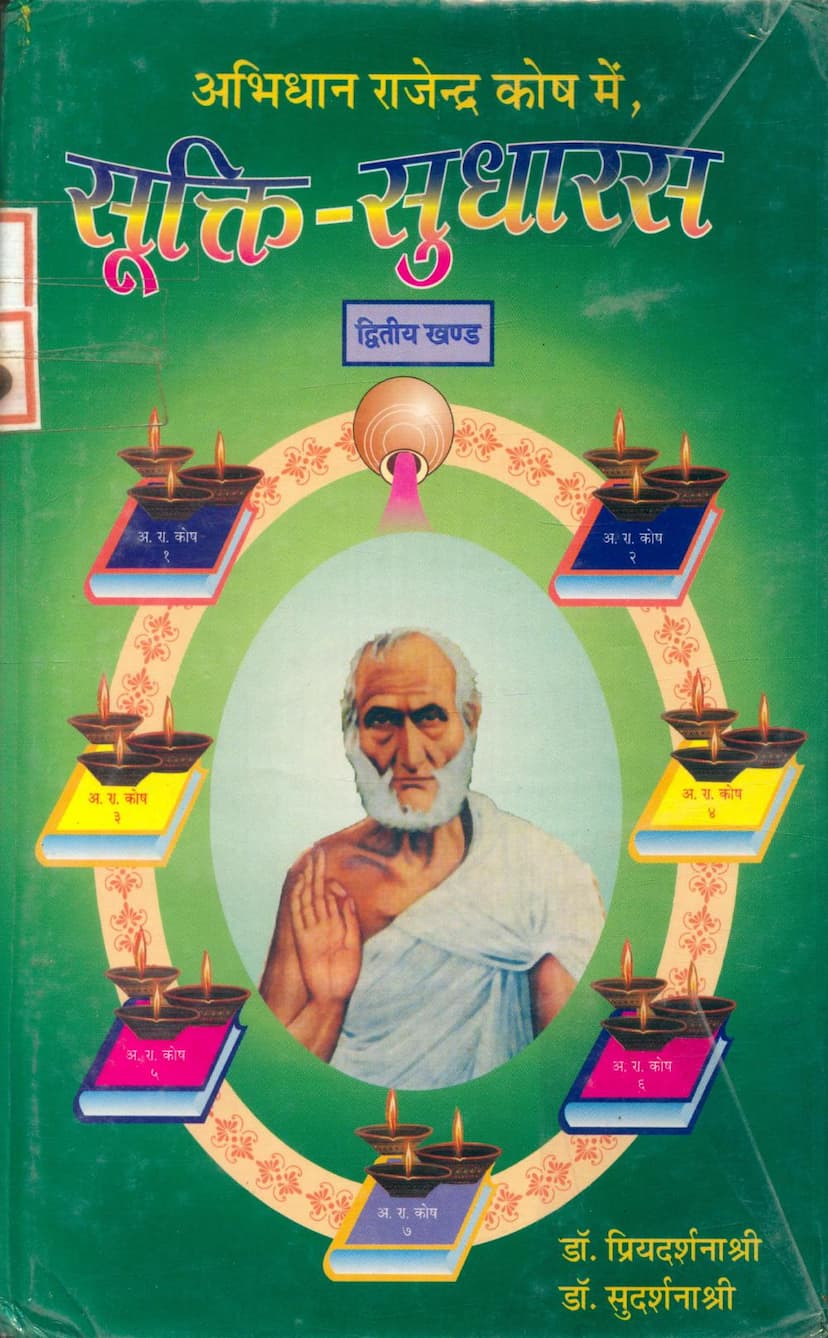Abhidhan Rajendra Koshme Sukti Sudharas Part 02
Added to library: September 1, 2025

Summary
This document is the second volume of "Sukti Sudharas" (Nectar of Wise Sayings) from the "Abhidhan Rajendra Kosh" (Rajendra Dictionary). Here's a comprehensive summary of its key aspects:
1. Core Purpose and Content:
- Compilation of Aphorisms: The primary purpose of this book is to present a collection of wise sayings, aphorisms, and insightful verses compiled from the monumental "Abhidhan Rajendra Kosh."
- Focus on the "Abhidhan Rajendra Kosh": The entire volume revolves around the teachings and wisdom contained within the "Abhidhan Rajendra Kosh," a vast dictionary created by the revered Jain Acharya, Vishwapujya Shrimad Vijay Rajendrasurishwarji Maharaj.
- Second Volume: This is specifically the second volume in a series that extracts and presents these aphorisms. The series aims to make the profound wisdom of the "Abhidhan Rajendra Kosh" accessible to a wider audience.
2. Authorship and Guidance:
- Authors: The book is authored by Sadhvi Dr. Priyadarshanashreeji and Sadhvi Dr. Sudarshanashreeji.
- Inspiration and Guidance: The work is deeply inspired by the teachings and legacy of Vishwapujya Shrimad Vijay Rajendrasurishwarji Maharaj. The authors are presented as disciples dedicated to spreading his knowledge.
- Endorsements: The volume features numerous "manta" (statements of opinion/endorsements) and "shubhakanksha" (good wishes) from prominent Jain scholars, saints, and public figures, highlighting the significance and value of this compilation.
3. Dedication to Vishwapujya Shrimad Vijay Rajendrasurishwarji Maharaj:
- Central Figure: The entire effort is dedicated to Vishwapujya Shrimad Vijay Rajendrasurishwarji Maharaj, often referred to as "Vishwapujya" (Worshipped by the World).
- Biographical Sketch: Page 2 provides a detailed biographical sketch of Vishwapujya Maharaj. Key points include:
- Birth: December 3, 1827, in Bharatpur, Rajasthan.
- Initiation (Deeksha): 1845 in Udaipur.
- Education: Extensive study of grammar, logic, philosophy, poetry, dictionaries, literature, and all 45 Jain Agamas.
- Acharya Pad: 1868 in Ahor, Rajasthan.
- Key Contributions: Restoration of religious practices ("Kriyoddhar"), pilgrimage site restoration ("Tirthoddhar"), establishment of new pilgrimage sites (Mohankheda), extensive literary output (61 books, including the "Abhidhan Rajendra Kosh").
- Recognition: The title "Vishwapujya" was bestowed upon him due to his monumental work, the "Abhidhan Rajendra Kosh."
- Death: December 21, 1906, in Rajgarh, Madhya Pradesh.
- Samadhi Sthal: A grand temple at Mohankheda, a significant pilgrimage site.
- Philosophy: Advocated "Live and Let Live," emphasizing universal friendship and compassion, and promoting the teachings of Lord Mahavir.
- Impact: His works are considered beneficial for the welfare of humanity, and his "Abhidhan Rajendra Kosh" is highly praised.
4. Structure and Presentation of "Sukti Sudharas" Vol. 2:
- Compilation Approach: The authors have extracted specific aphorisms ("suktis") from the "Abhidhan Rajendra Kosh" and presented them in this volume.
- Content Breakdown (from page 41 onwards): The volume contains a classified list of aphorisms, each presented with:
- Aphorism Number: A sequential number.
- Title/Theme: A descriptive title for the aphorism (e.g., "Suryodayast Bhranti" - Illusion of Sunrise and Sunset).
- Aphorism Text: The original saying, often in Prakrit or Sanskrit.
- Source Reference: Indication of the "Abhidhan Rajendra Kosh" volume and page number, and often the original Jain scripture where the saying is found.
- Hindi Translation/Explanation: A clear and simple explanation of the aphorism's meaning.
- Number of Aphorisms: Page 40 mentions that the entire "Sukti Sudharas" series comprises 2667 aphorisms across seven volumes. This particular volume (Vol. 2) contains 259 aphorisms.
- Scope of Sources: The aphorisms are not limited to Jain scriptures; they also draw from Vedic texts, Upanishads, Gita, Mahabharata, Ayurveda, Jyotisha, Nitishastra, Puranas, Smritis, Panchatantra, Hitopadesha, etc., as referenced in the "Abhidhan Rajendra Kosh."
- Appendices: The book includes several appendices for user convenience:
- First Appendix: Alphabetical index of aphorisms.
- Second Appendix: Subject-wise index of aphorisms.
- Third Appendix: Index of page numbers from the "Abhidhan Rajendra Kosh."
- Fourth Appendix: Index of verses/shlokas from Jain and non-Jain texts.
- Fifth Appendix: Bibliography of reference works used in "Sukti Sudharas."
5. Key Themes and Values Conveyed:
The aphorisms in this volume cover a wide range of spiritual, ethical, and philosophical topics, including:
- The Nature of Reality: Illusions, impermanence of the world, the true nature of the soul.
- Spiritual Practice: The importance of study (swadhyay), discipline (samyam), detachment (vairagya), penance (tapas), and self-control.
- Ethical Conduct: Honesty, truthfulness, non-violence (ahimsa), compassion, humility, refraining from gossip and criticism.
- The Dangers of Worldly Attachments: Sensual pleasures, wealth, family ties, ego, greed, lust, anger, and their negative consequences.
- The Value of Human Life: The rarity and importance of human birth, the need for diligent effort and non-procrastination.
- The Role of a Guru: The significance of a true spiritual guide and the disciple's duty towards them.
- The Importance of Knowledge and Wisdom: The power of true knowledge and the folly of ignorance.
- The Goal of Liberation (Moksha): The path to spiritual freedom through right faith, knowledge, and conduct.
6. Overall Impression:
"Abhidhan Rajendra Kosh mein Sukti Sudharas Part 02" is a profound compilation that aims to distill the vast wisdom of Acharya Rajendrasurishwarji Maharaj into digestible and meaningful aphorisms. It serves as a guide for spiritual seekers, emphasizing ethical living, self-awareness, and the pursuit of liberation, all rooted in the comprehensive knowledge preserved in the "Abhidhan Rajendra Kosh." The book is a testament to the authors' dedication and the enduring legacy of Vishwapujya Maharaj.